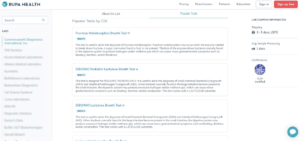Each month, the CDI team rounds up some of the latest #GIcommunity research, news, and trends and highlights how they impact functional GI diagnostics and treatment of patients worldwide.
This month, our roundup features a new cost-benefit analysis between hydrogen breath testing and the use of rifaximin for IBS-D and two additional studies related to noninvasive treatments of functional GI disorders, including IBS-C and dyspepsia.
Cost-Benefit Analysis of Hydrogen Breath Test-Directed Rifaximin for Treatment of Diarrhea-Predominant Irritable Bowel Syndrome
In a new study published online in Clinical Gastroenterology and Hepatology, a research team including Alicia Muratore, MD, MBA, Eric D. Shah, MD, MBA, FACG, and Walter W. Chan, MD, MPH, found that the use of rifaximin for IBS-D should be directed by hydrogen breath testing. The researchers state that HBT-restricted rifaxmin is less costly and more effective than unrestricted use, although rifaximin (with or without HBT) is less cost-effective than a low FODMAP diet.
Electrical stimulation alleviates abdominal pain, symptoms in IBS with constipation
According to a study published in the American Journal of Gastroenterology, transcutaneous electrical acustimulation (TEA) can improve abdominal pain and constipation symptoms in patients with IBS compared with a sham procedure. TEA is a noninvasive method that replaces needles with surface electrodes. Researchers are hopeful that this treatment option could be performed at home daily by patients in the future, which makes it more accessible for patients than traditional acupuncture.
Herbal Treatment for Dyspepsia Validated in Randomized Trial
While the poster was presented earlier this year at DDW2022, a study on herbal treatment for dyspepsia is gaining industry attention as the pharmacologic-grade product continues to get approval by regulatory authorities. The randomized, double-blind, placebo-controlled trial was specifically designed to test a product with a defined and limited number of potentially active herbal components. The herbal treatment developed to control symptoms of functional GI diseases was found to be effective for dyspepsia, with the greatest improvement related to postprandial distress.
Upcoming Live Class: The New Gold Standard: Integrating CDI’s Breath Testing Program into your Functional GI Diagnostic Strategy
CDI is proud to sponsor the upcoming Rupa Health Live Class for naturopaths and integrative practitioners, which will be held on Wednesday, October 5th at 2pm EDT and available on-demand thereafter.
Non-invasive at-home breath testing has quickly become the new gold standard when diagnosing patients presenting with symptoms related to functional GI disorders – also known as Disorders of the Gut-Brain Interaction (DGBI), including Small Intestinal Bacterial Overgrowth (SIBO), Intestinal Methanogen Overgrowth (IMO), and carbohydrate malabsorption like fructose, sucrose or lactose.
Join integrative physician Dr. Andrew Wong and functional nutritionist Araceli Benavides from Capital Integrative Health for a live class to discuss best practices for integrating CDI’s breath testing program into a functional GI diagnostic strategy.
Some of the topics covered will include:
- The signs and symptoms of SIBO, IMO, and carbohydrate malabsorption and the links to IBS and other functional GI disorders
- The benefits of CDI’s at-home breath testing program in a post-COVID environment
- How to correctly interpret breath test results
- Potential treatment and follow-up strategies for patients with a positive diagnosis
The speakers will also review a case study of a patient who beat chronic IBS after suffering for 15 years.
Recap of Recent CDI News
CDI Expands Access to Naturopathic & Integrative Medicine Community Through New Partnership with Rupa Health



